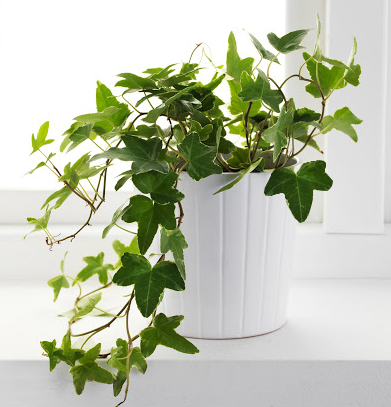Ivy varieties are many…. there are solid greens, variegated, small leafed, large leafed, curly leafed and miniature leafed. They are all easy to grow.
Water thoroughly but infrequently. When the soil feels dry, water the soil until the surface is totally wet and the water drains out of the bottom of the pot. Then do not water again until the soil is almost dry. If the air is dry, raise the humidity surrounding the plants by grouping ivies together on a tray full of wet pebbles, but do not allow the ivies to stand in water.
A north or east window or filtered or reduced light from a south or west window is satisfactory. Ivies respond well to artificial fluorescent light conditions.
In the home, feed actively growing ivies monthly with any foliage houseplant fertilizer, according to the manufacturer’s directions. Do not use fertilizer when plants stop growing either in the heat of summer, or when temperatures are cool.
The most common ailment is spider mite infestation. Spider mites thrive in the warm, dry, home environment. Spider mite damage is recognized in the earliest stages by pinpoint yellow speckles on older foliage toward the base of the stems. Those leaves then turn yellow; in advanced stages the webs develop over the leaves and stems, and leaves become brown, shriveled, and dried out. Raising the humidity and lowering the air temperature can help reduce spider mite problems by making the environment less hospitable to these pests. Infested plants can be sprayed or dipped in warm soapy water several days in a row to kill the mites. Heavy infestations may require chemical control.



